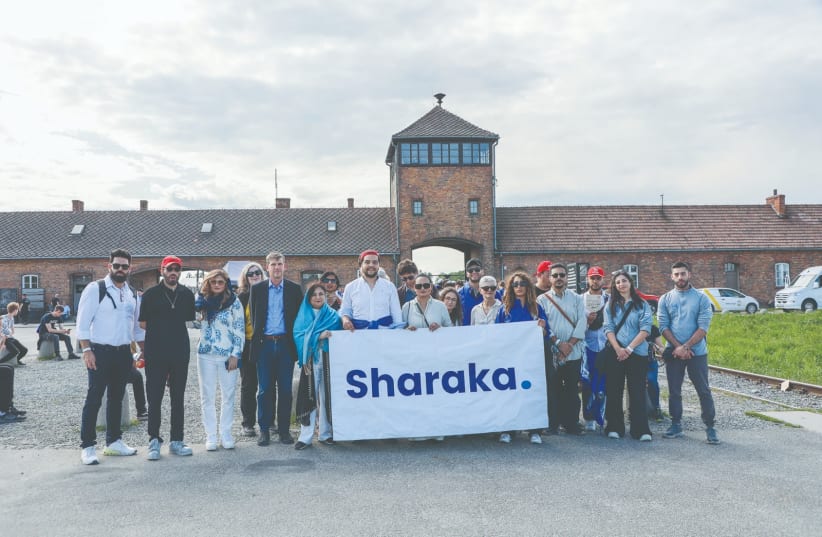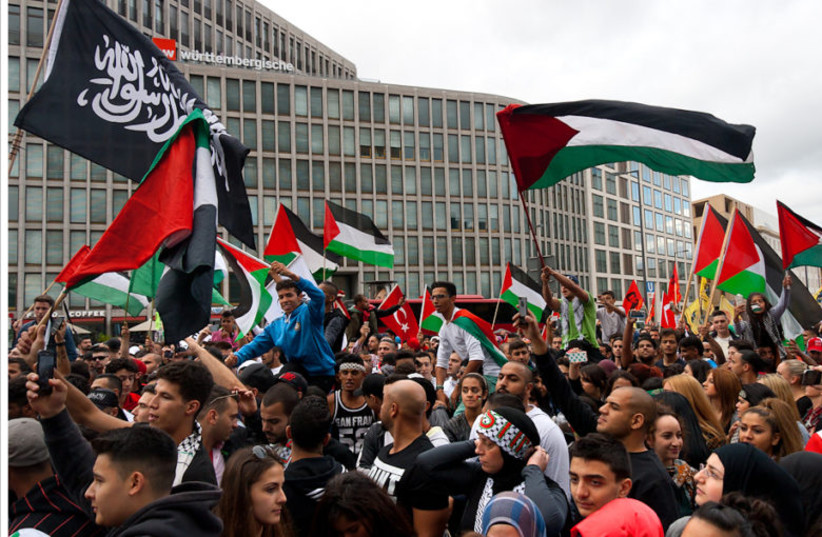Only 80 years ago, within the lifetime of some alive, countless trains, packed with terrified children, women and men, young and old, arrived at Auschwitz-Birkenau, returning empty bring more people to their senseless torture and death. Thus were helpless Jews from across the European continent sent to dozens of death camps by the Nazis in Germany and their collaborators across Europe.
How ironic, then, that I write these words as I travel by train, comfortably, from Berlin to Warsaw.
This train is different too, in that I have the honor of leading a delegation of 40 Arab and Muslim leaders and activists who bravely agreed to participate in a unique Holocaust education program organized by Sharaka (“Partnership” in Arabic), a non-governmental initiative that builds peace, dialogue, and cooperation on the basis of the Abraham Accords.
This groundbreaking program, backed by the Claims Conference (the Conference on Jewish Material Claims Against Germany), is taking its 4 fourth and largest delegation of civic leaders and aspiring activists to date, to Germany and Poland as part of its Holocaust education tour, and will participate in the International March of the Living.
Too many in the Arab and Muslim world, and frighteningly, too many in the West, have been swept up by dangerous Hamas/Hezbollah/Islamic Republic propaganda masquerading as human rights activism. Holocaust denial or revisionism and blatant antisemitism are rampant.
However, despite these challenges, despite online harassment and sometimes threats to their physical safety, this small group, increasing every year, understands that such radicalism is not only dangerously antisemitic and anti-Western, but also seeks to undermine orderly and civilized societies everywhere. Such radicalism harms moderate Muslims as it targets Jews and other minorities. Since Holocaust is barely taught in the Arab and Muslim world, these brave individuals came to learn about – and eventually lead their communities away from – such crippling radicalism.
Group comprised 40 people from several Muslim countries and some Israeli Jews
The group comprised 40 men and women, including young leaders from Morocco, activists from Bahrain and Tunisia, Muslim peace activists from Pakistan, Bangladesh, Sri Lanka, and Iran (living in the West), two influential imams, an amazing group of Israeli-Arab youth leaders, and a handful of Israeli Jews.
Together, we learned about the rise of Nazi extremism in Germany – how the most civilized and educated country in the world came to commit the most barbaric act of genocide in history.
We met with parliament members such as Armin Laschet, who heads the Abraham Accords Institute in the German Bundestag; toured the Wansee Villa where the Final Solution was coldly planned; and met with Dr. Felix Klein, the German High Commissioner for Combating Antisemitism.
We visited the eerie Berlin Holocaust memorial, spoke with Christian, Muslim, and Jewish Germans who work to promote Holocaust education and combat antisemitism, notably Kim Robin Stoller, and saw first-hand how Germany is ensuring that such radicalism does not rise again. We were welcomed and supported by the US embassy in Berlin as we have been supported by the State Department and various US and many European embassies around the Middle East.
Continuing our immersive educational program, we headed to Poland, where some three million Jews lived before the war and where most of the continent’s Jews were gathered to be mass-murdered.
Many participants will also travel to Israel where they will continue to study the Holocaust and Jewish and Israeli history and society in depth and create real human bridges with Israelis of all stripes – Jews, Muslims, Christians and Druze, religious and secular, Left and Right – all working to build a shared society and peace in the region.
With each year and each delegation, the circle grows of Arabs and Muslims committed to peace, moderation, and combating radicalism and antisemitism. From a small group in 2022, where many were hesitant to post on social media fearing backlash or physical violence, 40 such leaders are proudly participating and making their voices clear. We believe that there is a silent majority in the region receptive to hope, peace, and change.
The Abraham Accords, signed in 2020, began a realignment process for the broader Middle East and a chance for Jewish-Muslim reconciliation. The Accords introduced a framework whereby nations could positively and diplomatically engage to solve problems, rather than wield boycotts, wars, or terror. They allowed for a new dynamic, the chance for normalization and people-to-people engagement.
The October 7 attack with its declaration of war was a deliberate attempt by the Iran-led extremist camp to stop this progression toward peace. It is no surprise that those countries seeking to modernize and grow their economies are also the ones seeking to sign peace accords with Israel and combat radicalism at home and abroad.
Eighty years ago, my relatives were among the millions shipped to their tragic and gruesome deaths on trains from around Europe to Auschwitz. Today, I am traveling comfortably on a train, not to my death surrounded by other desperate Jews, but working toward peace and prosperity, surrounded by Muslim and Arab friends, colleagues and allies who share this dream.
The writer is the executive director of Sharaka. He is an Israeli author, speaker, and researcher on issues related to Israel, the Middle East, and the Jewish world.

